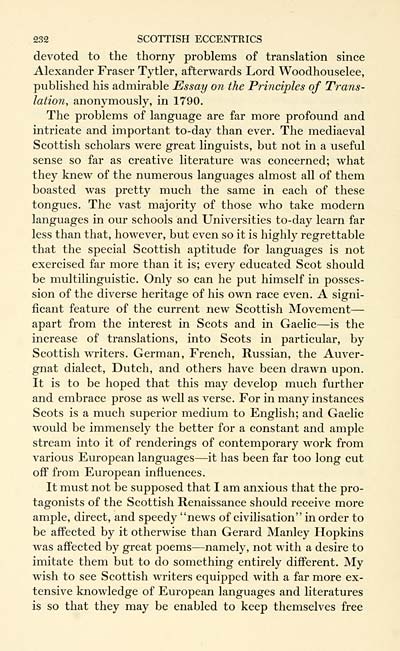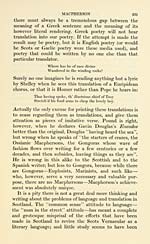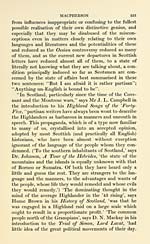Ossian Collection > Scottish eccentrics
(248)
Download files
Complete book:
Individual page:
Thumbnail gallery: Grid view | List view

232 SCOTTISH ECCENTRICS
devoted to the thorny problems of translation since
Alexander Fraser Tytler, afterwards Lord Woodhouselee,
published his admirable Essay on the Principles of Trans-
lation, anonymously, in 1790.
The problems of language are far more profound and
intricate and important to-day than ever. The mediaeval
Scottish scholars were great linguists, but not in a useful
sense so far as creative literature was concerned; what
they knew of the numerous languages almost all of them
boasted was pretty much the same in each of these
tongues. The vast majority of those who take modern
languages in our schools and Universities to-day learn far
less than that, however, but even so it is highly regrettable
that the special Scottish aptitude for languages is not
exercised far more than it is; every educated Scot should
be multilinguistic. Only so can he put himself in posses-
sion of the diverse heritage of his own race even. A signi-
ficant feature of the current new Scottish Movement —
apart from the interest in Scots and in Gaelic — is the
increase of translations, into Scots in particular, by
Scottish writers. German, French, Russian, the Auver-
gnat dialect, Dutch, and others have been drawn upon.
It is to be hoped that this may develop much further
and embrace prose as well as verse. For in many instances
Scots is a much superior medium to English; and Gaelic
would be immensely the better for a constant and ample
stream into it of renderings of contemporary work from
various European languages — it has been far too long cut
off from European influences.
It must not be supposed that I am anxious that the pro-
tagonists of the Scottish Renaissance should receive more
ample, direct, and speedy "news of civilisation" in order to
be affected by it otherwise than Gerard Manley Hopkins
was affected by great poems — namely, not with a desire to
imitate them but to do something entirely different. My
wish to see Scottish writers equipped with a far more ex-
tensive knowledge of European languages and literatures
is so that they may be enabled to keep themselves free
devoted to the thorny problems of translation since
Alexander Fraser Tytler, afterwards Lord Woodhouselee,
published his admirable Essay on the Principles of Trans-
lation, anonymously, in 1790.
The problems of language are far more profound and
intricate and important to-day than ever. The mediaeval
Scottish scholars were great linguists, but not in a useful
sense so far as creative literature was concerned; what
they knew of the numerous languages almost all of them
boasted was pretty much the same in each of these
tongues. The vast majority of those who take modern
languages in our schools and Universities to-day learn far
less than that, however, but even so it is highly regrettable
that the special Scottish aptitude for languages is not
exercised far more than it is; every educated Scot should
be multilinguistic. Only so can he put himself in posses-
sion of the diverse heritage of his own race even. A signi-
ficant feature of the current new Scottish Movement —
apart from the interest in Scots and in Gaelic — is the
increase of translations, into Scots in particular, by
Scottish writers. German, French, Russian, the Auver-
gnat dialect, Dutch, and others have been drawn upon.
It is to be hoped that this may develop much further
and embrace prose as well as verse. For in many instances
Scots is a much superior medium to English; and Gaelic
would be immensely the better for a constant and ample
stream into it of renderings of contemporary work from
various European languages — it has been far too long cut
off from European influences.
It must not be supposed that I am anxious that the pro-
tagonists of the Scottish Renaissance should receive more
ample, direct, and speedy "news of civilisation" in order to
be affected by it otherwise than Gerard Manley Hopkins
was affected by great poems — namely, not with a desire to
imitate them but to do something entirely different. My
wish to see Scottish writers equipped with a far more ex-
tensive knowledge of European languages and literatures
is so that they may be enabled to keep themselves free
Set display mode to: Large image | Transcription
Images and transcriptions on this page, including medium image downloads, may be used under the Creative Commons Attribution 4.0 International Licence unless otherwise stated. ![]()
| Early Gaelic Book Collections > Ossian Collection > Scottish eccentrics > (248) |
|---|
| Permanent URL | https://digital.nls.uk/81911320 |
|---|
| Description | Selected books from the Ossian Collection of 327 volumes, originally assembled by J. Norman Methven of Perth. Different editions and translations of James MacPherson's epic poem 'Ossian', some with a map of the 'Kingdom of Connor'. Also secondary material relating to Ossianic poetry and the Ossian controversy. |
|---|
| Description | Selected items from five 'Special and Named Printed Collections'. Includes books in Gaelic and other Celtic languages, works about the Gaels, their languages, literature, culture and history. |
|---|

